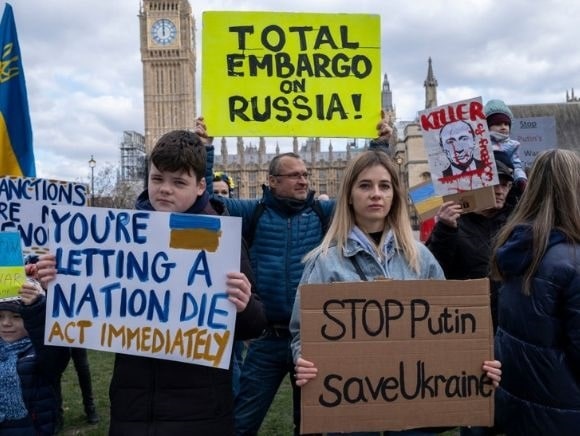The world suffers starving millions while Russia keeps needed wheat and other grain bottled up in Ukrainian ports. Many believe an essential element of support to the Kyiv government is breaking the Kremlin’s blockade, allowing Ukraine to move cargo ships through the Black Sea. Others believe the risk is very high, prompting a wider conflict between NATO forces and the Russian military. Nonetheless, countries in distress depend on the wheat Ukraine has historically provided and has been artificially put in short supply.
 Since Russian President Putin’s unprovoked and barbarous invasion in February, the worst of the world’s famines are reaching unprecedented levels in some African countries. “One person is likely dying of hunger every 48 seconds in drought-ravaged Ethiopia, Kenya, and Somalia, according to estimates by Oxfam (Oxford Committee for Famine Relief) and Save the Children…highlighting the world’s repeated failure to stave off preventable disasters,” an Oxfam press release stated. President Putin’s contribution to preventing needed food products to the starving is not a “repeated failure,” it is purposeful. According to the United Nations World Food Program, estimates of the numbers of starving around the world usually fed by the stymied food shipments from Ukraine’s Black Sea ports are 400 million people worldwide. ABC News foreign correspondent Tom Soufi Burridge reported:
Since Russian President Putin’s unprovoked and barbarous invasion in February, the worst of the world’s famines are reaching unprecedented levels in some African countries. “One person is likely dying of hunger every 48 seconds in drought-ravaged Ethiopia, Kenya, and Somalia, according to estimates by Oxfam (Oxford Committee for Famine Relief) and Save the Children…highlighting the world’s repeated failure to stave off preventable disasters,” an Oxfam press release stated. President Putin’s contribution to preventing needed food products to the starving is not a “repeated failure,” it is purposeful. According to the United Nations World Food Program, estimates of the numbers of starving around the world usually fed by the stymied food shipments from Ukraine’s Black Sea ports are 400 million people worldwide. ABC News foreign correspondent Tom Soufi Burridge reported:
“Ukraine is a vast agricultural production house. The country produces 46% of the world’s sunflower oil exports, 37% of global millet (a small grain cereal) exports, 13% of all barley exports, 10% of total wheat exports, 8% of honey and 7% of walnut exports, according to the Ukrainian Agribusiness Club. Before Russia invaded, most of Ukraine’s food production was exported through the country’s Black Sea ports.”
Many global leaders and policy pundits believe the solution is to break the blockade with sea power. One such advocate is US Navy Admiral James Stavridis, retired, former Supreme Allied Commander Europe. In his opinion piece for Bloomberg, “How to Break Russia’s Blockade of Ukraine’s Black Sea Ports,” Stavridis explains there is a risk of hostile engagement of the Kremlin’s Black Sea fleet of 40 surface combatant ships and seven submarines. Nevertheless, he suggests a late 1980s Persian Gulf operation called “Earnest Will” could serve as a model to thwart the Russian blockade. When Iran jeopardized a significant flow of Arabian Gulf oil by closing off the Straits of Hormuz, the oil tanker fleet was reflagged as US, and US Navy combat vessels escorted the tankers through the Arabian Gulf Straits of Hormuz. “As the world faces food shortages due to the illegal blockade of Ukraine by Russia, the US and its allies should consider a similar response,” Stavridis suggests. “Earnest Will kept the oil flowing and took away leverage from the Iranians.”

Army General Mark Milley (Photo by Rich Graessle/Icon Sportswire via Getty Images)
However, as Admiral Stavridis would probably agree, the Black Sea is not the Arabian Gulf, and Russia is not Iran. There would be a significant risk, Chairman of the Joint Chiefs of Staff, Army General Mark Milley, told reporters in London recently, according to Defense News. “You can take the grain out by truck or train, or you can take it out by sea. Right now, the sea lanes are blocked by mines and the Russian navy. In order to open up those sea lanes would require a very significant military effort…[I]t would be a high-risk military operation that would require significant levels of effort,” should policymakers decide to break the blockade, Milley said.
Sanctions on Moscow, albeit not the most severe, are in place. The Biden administration and NATO have ponied up billions in sophisticated weapons and humanitarian assistance to the Kyiv government. But sanctions and helping beat back the Russians around Kyiv and eastern Ukraine have not helped, so far, open the available Black Sea ports for vital agribusiness. US government leaders have been adamant regarding US boots on the ground or escalating the fighting to a broader war. Instead of a wider war, this policy has produced a protracted war playing into a plan to wear out the Ukrainian military and discourage Kyiv into submission. NATO and US naval forces are formidable, and maybe it’s time to make clear to Putin what is at stake when confronting the alliance. So far, Moscow seems to have the momentum in the battle of wills. If nothing else, breaking the blockade would put that notion to rest.
The views expressed are those of the author and not of any other affiliation.




